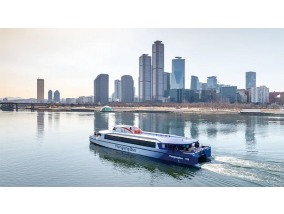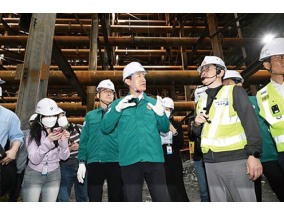 이미지 확대보기
이미지 확대보기Repeated Safety Accidents and Poor Management Systems
On the 25th, a bridge collapse occurred at a construction site of Section 9 of the Seoul-Sejong Expressway in Seobuk-gu, Cheonan, Chungcheongnam-do, resulting in a tragic accident that killed four people and injured six others.This incident comes just months after a fatal accident on November 7, 2024, at Hyundai Motor’s electric vehicle factory construction site in Ulsan, where a worker in his 50s fell to his death while working on roof panel installation. The recurrence of such fatal accidents has heightened concerns about the company’s safety management practices.
Experts cite excessive load and structural fastening failures as potential causes of the latest bridge collapse, pointing to poor construction processes and inadequate safety inspections. These issues indicate fundamental flaws in Hyundai Engineering’s overall safety management system rather than simple negligence.
Serious Deficiencies in Quality Control Systems
In addition to safety accidents, Hyundai Engineering is plagued by quality issues. Just a year ago, in May 2024, the company publicly apologized after 50,000 construction defects were discovered in the "Hillstate Oryong" apartment complex in Namak New Town, Muan County, Jeollanam-do. This scandal highlighted severe shortcomings in Hyundai Engineering’s quality management system, severely damaging consumer trust.According to the Ministry of Land, Infrastructure, and Transport, Hyundai Engineering ranked first in the number of defect-related complaints among construction companies between March and August 2024. Over the past five years (September 2019–August 2024), Hyundai Engineering recorded 288 defect cases, placing it in the disgraceful position of 8th among the top 20 companies with the most defects, while Hyundai E&C also ranked 14th with 208 cases, further tarnishing its reputation.
These quality issues, combined with safety concerns, have significantly eroded trust in the company. The ongoing crises suggest that Hyundai Engineering’s challenges stem from structural deficiencies in its management system rather than temporary setbacks.
Worsening Financial Performance and Credit Rating Downgrade... A "Burden" Within the Group
 이미지 확대보기
이미지 확대보기Hyundai Engineering’s crisis is not limited to safety issues. The company reported an estimated consolidated revenue of KRW 14.7653 trillion in 2024, but also recorded an operating loss of KRW 1.2361 trillion, marking a transition into deficit. Net losses are projected to reach KRW 990.6 billion. The primary causes of these losses are increasing costs associated with overseas plant projects such as the RDMP Balikpapan project in Indonesia and the Jafurah project in Saudi Arabia, including additional quality-related expenses and extended construction periods. As a result of these substantial losses, the debt ratio is expected to rise from 114.8% in September 2024 to 243.8% by the end of December 2024, worsening the company’s financial difficulties.
This financial downturn has also negatively impacted its parent company, Hyundai E&C. Despite achieving consolidated revenue of KRW 32.6944 trillion in 2024, a 10.3% increase compared to the end of 2023, Hyundai E&C posted an operating loss of KRW 1.2209 trillion, marking its first deficit in 23 years. The declining status of Hyundai E&C and Hyundai Engineering, once core affiliates of Hyundai Motor Group, has now led to concerns that they are becoming burdens within the conglomerate.
 이미지 확대보기
이미지 확대보기The financial market has also reacted negatively to Hyundai Engineering’s mounting losses, safety incidents, and quality issues. On the 22nd, Korea Investors Service (KIS) downgraded Hyundai Engineering’s credit rating outlook from "Stable" to "Negative."
Similarly, NICE Investors Service (NICE) placed Hyundai Engineering under a "downgrade review" watch, raising concerns about the company’s financial health. A potential credit rating downgrade could further hinder Hyundai Engineering’s ability to secure funding, exacerbating its financial crisis.
Fundamental Overhaul Needed to Regain Trust
The challenges facing Hyundai Engineering and Hyundai E&C appear to stem from structural issues rather than temporary setbacks. The repeated safety accidents, quality problems, and massive deficits in overseas projects indicate that these problems cannot be resolved without fundamental management reforms.Some industry observers argue that Hyundai Engineering and Hyundai E&C need more than just apologies and short-term fixes. They emphasize the necessity of a complete overhaul of the safety management system, accountability for those responsible, and financial restructuring.
To restore their reputation as "construction powerhouses" and regain customer trust, Hyundai Engineering and Hyundai E&C must prioritize safety and quality while implementing fundamental business reforms. Only through sustainable change and responsible management can they reclaim their status as industry leaders.
Doo KyoungWoo (kwd1227@fntimes.com)
[관련기사]
가장 핫한 경제 소식! 한국금융신문의 ‘추천뉴스’를 받아보세요~
데일리 금융경제뉴스 Copyright ⓒ 한국금융신문 & FNTIMES.com
저작권법에 의거 상업적 목적의 무단 전재, 복사, 배포 금지








![용산구 ‘나인원한남’ 88평, 9억 상승한 167억원에 거래 [일일 아파트 신고가]](https://cfnimage.commutil.kr/phpwas/restmb_setimgmake.php?pp=006&w=284&h=214&m=5&simg=2025071010042800278b372994c952115218260.jpg&nmt=18)


![전광우 초대 금융위원장 “AI혁명 산업 대변혁기, '적극적 금융' 역할 중요” [2026 신년 인터뷰]](https://cfnimage.commutil.kr/phpwas/restmb_setimgmake.php?pp=006&w=284&h=214&m=5&simg=2026010400012607134dd55077bc2118218214118.jpg&nmt=18)
![한국 경제 돌파구 ‘결정적 시기’ 금융 선순환 가속·AI혁신 대응 [병오년을 열며]](https://cfnimage.commutil.kr/phpwas/restmb_setimgmake.php?pp=006&w=284&h=214&m=5&simg=2026010400055108216dd55077bc2118218214118.jpg&nmt=18)
![용산 ‘한가람’ 25평, 9.6억 내린 16.2억원에 거래 [이 주의 하락아파트]](https://cfnimage.commutil.kr/phpwas/restmb_setimgmake.php?pp=006&w=284&h=214&m=5&simg=2023031509425002992b372994c951191922428.jpg&nmt=18)

![용산 ‘한가람’ 25평, 9.6억 내린 16.2억원에 거래 [이 주의 하락아파트]](https://cfnimage.commutil.kr/phpwas/restmb_setimgmake.php?pp=006&w=110&h=79&m=5&simg=2023031509425002992b372994c951191922428.jpg&nmt=18)



